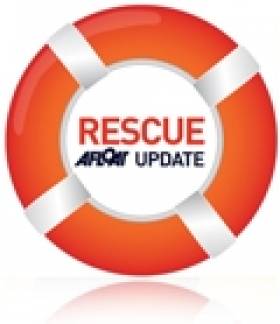Displaying items by tag: UK
Lost Irish Fishermen Found Safe and Sound Off Minehead
FOUR Irish fishermen reported missing on Sunday have been found in good spirits off the coast of Minehead in Somerset.
This Is The West Country reports that the four men had left Helvick harbour in Co Waterford early on Sunday on a fishing trip but got lost shortly thereafter.
After contacting the coastguard with their concerns, the Helvick Head RNLI lifeboat was dispatched to Minehead, where the lost boat had been found by another fishing vessel, Faoilean Ban.
The lost fishermen subseqently followed the Faoilean Ban back to port at Helvick.
Wayfarer Association
 The Wayfarer: 16 feet, with spinnaker, a family day sailer, cruiser and racing dinghy for inland and coastal waters. Stable and easily managed by beginners yet it's PY of 1099 reflects excellent Class and mixed fleet performance. Friendly and social the Class offers three annual championships, group insurance, and helpful websites. Click here for all the latest Wayfarer News.
The Wayfarer: 16 feet, with spinnaker, a family day sailer, cruiser and racing dinghy for inland and coastal waters. Stable and easily managed by beginners yet it's PY of 1099 reflects excellent Class and mixed fleet performance. Friendly and social the Class offers three annual championships, group insurance, and helpful websites. Click here for all the latest Wayfarer News.
Wayfarer Class, c/o Laurence Denyer, Secretary, 25 Hillside Drive, Belfast BT9 5EJ, N. Ireland. Email: [email protected]
The United Kingdom Wayfarer Association (UKWA) operate a national class association (NCA) in the UK and Republic of Ireland in accordance with the constitution of the Wayfarer International Class Association.
We are always delighted to welcome new members to the association. Wayfarer boat owners can join as an Individual (Full Member) or as a Family. We have many non-boat owners who may join as an Associate Member.
Why should I become a member of UKWA – the association of Wayfarer owners? We pride ourselves on being a very friendly association and are always delighted to welcome new members. You don't have to own a Wayfarer to be a member, and many people choose to join while looking for a boat so that they can take advantage of membership, espcially our magazine and website, in the meantime. The owner of a Wayfarer has the opportunity to join a large group of sociable and knowledgeable sailors who together know everything there is to know about this amazing dinghy.
About the Wayfarer (courtesy of the UK Wayfarer Association website)
Did you know the ideal dinghy for beginners could also cruise the rugged West Coast of Scotland, race in a near gale or while away a long summer's afternoon pottering with the family?
With a Wayfarer you can do it all:
* Learn to sail
* Day-sail with the children
* Cruise to adventure (some Wayfarer sailors tackle journeys 'big boat' cruisers would be wary of!)
* Race with spinnakers, at your local club or at open, national and international events with one of the most competitive fleets around
This 16 footer is one boat you won't grow out of.
To get the most from your boat join the United Kingdom Wayfarer Association and enjoy a full programme of racing and cruising events plus all the benefits of membership.
Boat Design
The Wayfarer dinghy was designed by Ian Proctor in 1957 and has since acquired an unrivalled reputation as a tough and seaworthy cruising dinghy, yet at the same time being responsive and rewarding to race.
Probably there is no other centreboard boat in the world which combines these qualities as happily; it is this great versatility that makes her so outstanding as a racing and cruising boat.
Since the Wayfarer was originally designed there have been improvements in materials and production techniques which have lead to a variety of different versions all sharing the same hull shape and sail plan.
United Kingdom Wayfarer Association (UKWA)
Afloat's Graham Smith wrote, in the February/March 2009 issue: "2008 was a big year by Wayfarer standards as Ireland hosted the European Championships in Skerries in mid-September, although it only attracted a fleet of 23 boats, including five from abroad. Michael McNamara from the Norfolk Broads retained his title while Dave Kelly and Bernie Grogan of the host club were the best placed local entry and were awarded the Irish Championship to add to the Eastern regional title earned earlier in the season. The Wayfarer has its hard core of enthusiasts and while their numbers have probably never even reached the half century, there are 40 of them dotted around eight clubs. National Champions: Dave Kelly and Bernie Grogan, Skerries SC"
There is a space for Irish boating clubs and racing classes to use as their own bulletin board and forum for announcements and discussion. If you want to see a dedicated forum slot for your club or class, click here





























































